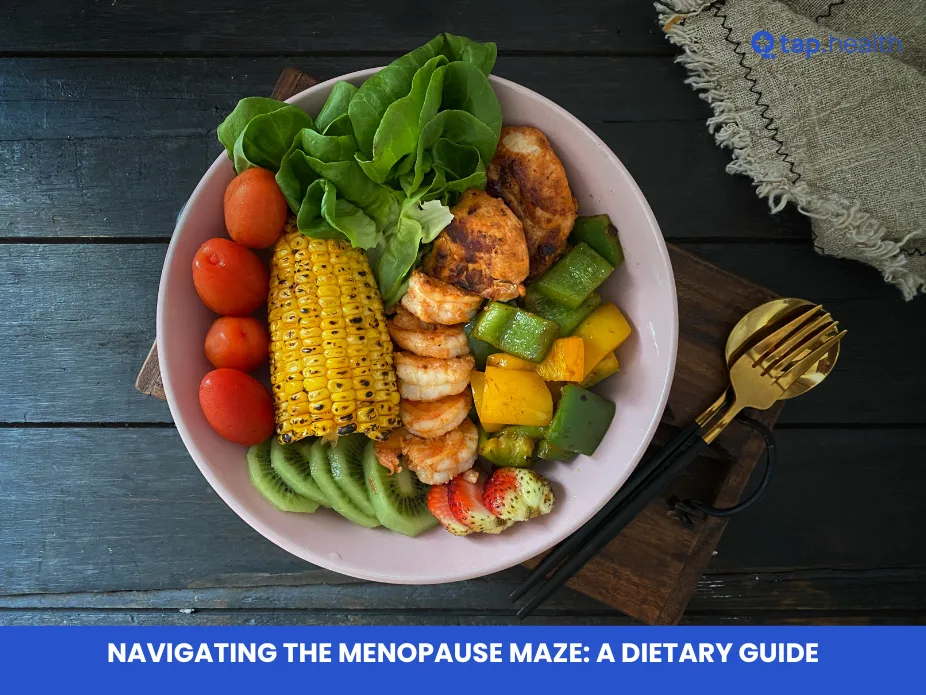During menopause, the production of estrogen and progesterone declines. This hormonal shift can influence various aspects of your health, including your metabolism, bone health, and weight management.
Key Dietary Considerations for Postmenopausal Women
1. Prioritize Calcium and Vitamin D
- Why it matters: These nutrients are crucial for maintaining strong bones and preventing osteoporosis.
- Rich sources: Dairy products (milk, yogurt, cheese), fortified plant-based milk, leafy green vegetables (kale, spinach), fatty fish (salmon, mackerel), and egg yolks.
- Tips:
- Opt for calcium-fortified foods and beverages.
- Get adequate sun exposure to boost vitamin D production.
- Consider supplements under medical guidance.
2. Embrace a Fiber-Rich Diet
- Why it matters: Fiber aids digestion, regulates blood sugar levels, and promotes a healthy weight.
- Rich sources: Whole grains (brown rice, whole-wheat bread), fruits (berries, apples), vegetables (broccoli, carrots), legumes (beans, lentils), and nuts.
- Tips:
- Gradually increase fiber intake to avoid digestive issues.
- Stay hydrated to prevent constipation.
3. Watch Your Weight
- Why it matters: Weight gain can increase the risk of chronic diseases like heart disease and type 2 diabetes.
- Strategies:
- Portion control: Use smaller plates and listen to hunger cues.
- Mindful eating: Pay attention to your food and savor each bite.
- Regular physical activity: Incorporate exercise into your routine.
4. Manage Blood Sugar Levels
- Why it matters: Uncontrolled blood sugar can lead to diabetes and other health problems.
- Strategies:
- Choose complex carbohydrates over simple sugars.
- Limit processed foods and sugary drinks.
- Maintain a healthy weight.
5. Reduce Sodium Intake
- Why it matters: High sodium intake can contribute to high blood pressure.
- Strategies:
- Limit processed foods and salty snacks.
- Use herbs and spices to flavor food.
6. Consider Phytoestrogens
- What are they: Plant-based compounds with estrogen-like effects.
- Rich sources: Soy products (tofu, edamame), flaxseeds, legumes, and fruits (strawberries, grapes).
- Note: While phytoestrogens may offer some benefits, consult your doctor before making significant dietary changes.
Real-Life Scenarios
- Sarah’s Story: Sarah, a 55-year-old woman, experienced hot flashes and night sweats during menopause. By incorporating calcium-rich foods and regular exercise into her routine, she was able to manage these symptoms effectively.
- Aisha’s Experience: Aisha, a 60-year-old woman, struggled with weight gain after menopause. By adopting a fiber-rich diet and reducing her intake of processed foods, she was able to maintain a healthy weight.
Expert Contributions
Dr. Emily Chen, a renowned nutritionist, emphasizes the importance of a balanced diet for postmenopausal women. She recommends consulting with a healthcare professional to create a personalized dietary plan.
Recommendations Grounded in Proven Research and Facts
- The National Institute on Aging (NIA) provides comprehensive information on menopause and dietary recommendations: https://www.nia.nih.gov/health/menopause
- The Mayo Clinic offers evidence-based advice on healthy eating and lifestyle habits for women of all ages: https://www.mayoclinic.org/healthy-lifestyle
FAQ on Navigating the Menopause Maze
- What are the best foods to eat during menopause?
- A balanced diet rich in fruits, vegetables, whole grains, lean protein, and low-fat dairy products is ideal.
- Can diet help with menopausal symptoms?
- Yes, a healthy diet can help alleviate symptoms like hot flashes, night sweats, and mood swings.
- Should I take hormone replacement therapy (HRT)? C
- onsult your doctor to discuss the potential benefits and risks of HRT.
- How much water should I drink daily?
- Aim for at least 8 glasses of water per day.
- Can I lose weight during menopause?
- Yes, with a combination of diet and exercise, you can lose weight and maintain a healthy weight.
Conclusion
By making informed dietary choices, postmenopausal women can improve their overall health and well-being. Remember, it’s essential to listen to your body, consult with a healthcare professional, and enjoy the journey to a healthier, happier you.



